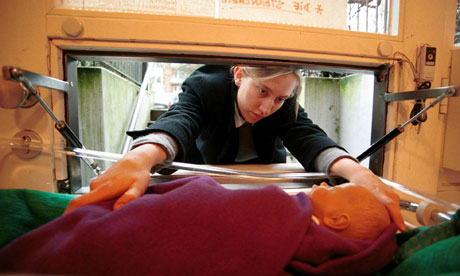
Over the last six years, the Polish branch of the Catholic charity Caritas has installed 50 baby hatches across the country. These hatches (heated boxes in the walls of hospitals and religious buildings where mothers can safely abandon their babies) have saved over 40 children in that time – but they are now under threat. In June the UN Committee on the Rights of the Child caused outrage when it protested that baby hatches violated article 7 of the UN Convention on the Rights of the Child (UNCRC), which states that every child has "the right to know and be cared for by his or her parents". Now the committee is taking the issue to the European parliament, provoking Caritas Poland to speak out passionately in defence of the hatches it has branded Okna Życia ("windows of life").
While Archbishop Józef Kowalczyk has suggested that the baby hatch has special importance for strongly Catholic Poland, which "has its own identity, its own culture and its own conscience" – the fact that access to abortion is severely restricted in the country means this statement may have an unintended relevance – it is not the only European country to provide them. The "foundling wheel" was a feature of churches and hospitals across medieval Europe, while the modern revival of the tradition began in Germany in 1999 when Gabriele Stangl, chaplain of Berlin's Waldfriede hospital, had a Babyklappe installed there. Today Germany has around 100 hatches, while Austria, Belgium, the Czech Republic, Hungary, Italy, Latvia, Lithuania, Portugal and Slovakia all also operate them. Around 400 children have been left in baby hatches across Europe since 2000.
In the UK, where section 27 of the Offences Against the Person Act 1861 makes "exposing children whereby life is endangered" an offence, there are no comparable schemes, but abandonment is still an issue. Figures from 2009 suggest an average of 16 babies are abandoned in the UK each year, most of them newborns, and of these nearly 34% die. Most are abandoned outdoors, and in such a situation it seems difficult to understand why baby hatches are not provided at our hospitals as a matter of routine.
But the baby hatch is far from a neutral measure, and the discussion around them has been couched in anti-choice rhetoric – unsurprising, since this debate is essentially one about how to deal with unwanted pregnancy. Kowalczyk's statement that "we have a duty to protect life at all costs" and Caritas Poland's assertion that "life is a fundamental value and its defence takes precedence over other laws" make the pro-life undertones of this controversy clear.
In fact, there is little evidence that these facilities save babies' lives at all, and there is no indication that they have an effect on infanticide rates. Meanwhile, a Medical University of Vienna study, published this week, found that the introduction of an "anonymous delivery" law in Austria in 2001 had more than halved rates of neonaticide, and while an annual average of only two to three babies were left in baby hatches, 30-40 babies were delivered anonymously. Geographically few and far between in any case, the baby hatch seems to have more worth as a symbol of the views of those who wish to influence the debate on reproductive rights – in other words, as a pro-life stunt – than as a life-saving measure.
However, the baby hatch is not simply useless, but may be actively harmful. According to Dr Maria Herczog, a sociologist and member of the UN Children's Rights Committee, baby hatches don't only violate the UNCRC, but also violate women's rights. Arguing that the social problems behind abandonment need to be addressed, Herczog has suggested that these facilities "encourage women to give birth in very insecure circumstances". Indeed, ultimately, the baby hatch provides nothing for the mother, leaving a physically and mentally vulnerable person wholly uncared for. And evidence produced by the University of Nottingham has suggested that the hatches are often used by partners and relatives, who may remove the child without the mother's consent, while measures like the Austrian "anonymous delivery" law have due regard for both the woman's autonomy and immediate welfare, as well as that of the child.
In the baby hatch scheme, women are invisible, and ignoring women and their agency can be fatal. The piteous case of Sarah Catt, jailed for eight years in September for inducing an abortion at full term showed starkly that without supporting the mother, we cannot hope to support the child. The baby hatch "solution" does anything but that.

